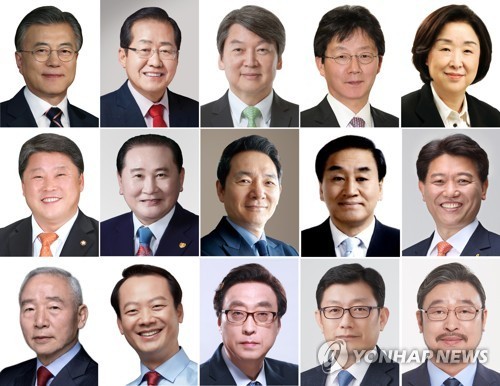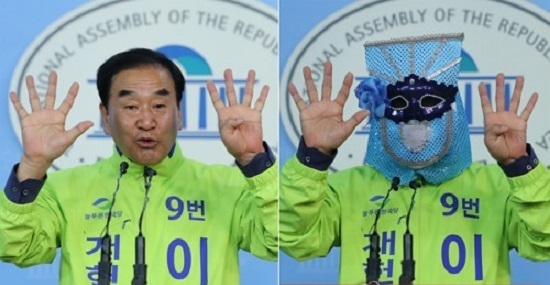Lesser-known candidates resort to desperate means to woo attention
By KH디지털2Published : April 19, 2017 - 10:37
Every candidate in the presidential election is naturally striving to win voter approval, but for some, especially lesser-known ones, attracting voter attention itself may prove to be difficult if not impossible, a political observers here noted Wednesday.
And such difficulty is what is forcing them to rely on different, or even sensational, means to turn the voters' attention their direction.
"Lesser-known candidates often have little choice but to try and beat other contenders by proposing new and surprising pledges or using other unconventional means to appeal to voters," said Kim Sung-soo, a political science professor at Seoul's Hanyang University.

Currently, a total of 15 candidates are running in the May 9 presidential election. Only six are from political parties with at least one parliamentary seat while eight others are nominees of parties that are less known, mostly due to their very recent foundation. One candidate is running as an independent.
Recent opinion surveys on the upcoming election showed that only five of them enjoy an approval rating of over 1 percent, though most of the rest were not even included in the polls due to their low public recognition.
Kim notes they may still have a very good reason to run for president.
"The very fact that they have run for presidency may go a long way for these people, who may run for a district office or a parliamentary seat in the future," the professor said.
For instance, Rep. Cho Won-jin of the revived Saenuri Party may in fact be more interested in letting himself and his party known for the next Assembly election, he added.
Cho is currently the only lawmaker of the new party, created by die-hard loyalists of ousted former President Park Geun-hye under the same name of her now-defunct former ruling party. Cho defected from the Liberty Korea Party, a spin-off of the former ruling party, to become the new Saenuri Party's presidential candidate.
His and his party's failure to win an Assembly seat in the next election may well mean the end of their road.
"There is nearly no possibility that any of these lesser-known candidates will actually win the presidential election," Kim said.
"And so, the only reason they will run in the election even when it requires them to pay 300 million won ($263,000) in trust funds is to establish themselves as a recognized figure for the next election."
Still, getting recognized or even being heard may not be easy especially when the five major candidates, or really the top two, are getting all the attention.
In most recent polls, two front-runners, Moon Jae-in of the liberal Democratic Party and Ahn Cheol-soo of the center-left People's Party garnered nearly or sometimes over 80 percent of all votes.
As Kim noted, the lesser-known candidates are relying on unconventional or even sensational methods to woo voter attention.

Lee Jae-oh, a former lawmaker of five terms and now the presidential candidate of his own new party created earlier in the year, proposed all presidential candidates hold a joint debate while wearing masks to conceal their identities, which he claims will allow voters to judge candidates only for their election pledges and policy visions.
"Let us conceal our names, faces and political affiliation and hold a policy debate to see who is the best candidate to save this country in crisis," he said at a press conference at the National Assembly on Monday.
His proposal for a masked debate sought to mimic a famous TV show, King of Masked Singers, where singers and other celebrities will sing while wearing masks to be judged only by their talent.
Lee's proposal has not won any serious response from his contenders, though he has apparently succeeded in attracting the attention of some people and the media. (Yonhap)








![[KH Explains] How should Korea adjust its trade defenses against Chinese EVs?](http://res.heraldm.com/phpwas/restmb_idxmake.php?idx=644&simg=/content/image/2024/04/15/20240415050562_0.jpg&u=20240415144419)










![[Today’s K-pop] Stray Kids to return soon: report](http://res.heraldm.com/phpwas/restmb_idxmake.php?idx=642&simg=/content/image/2024/04/16/20240416050713_0.jpg&u=)